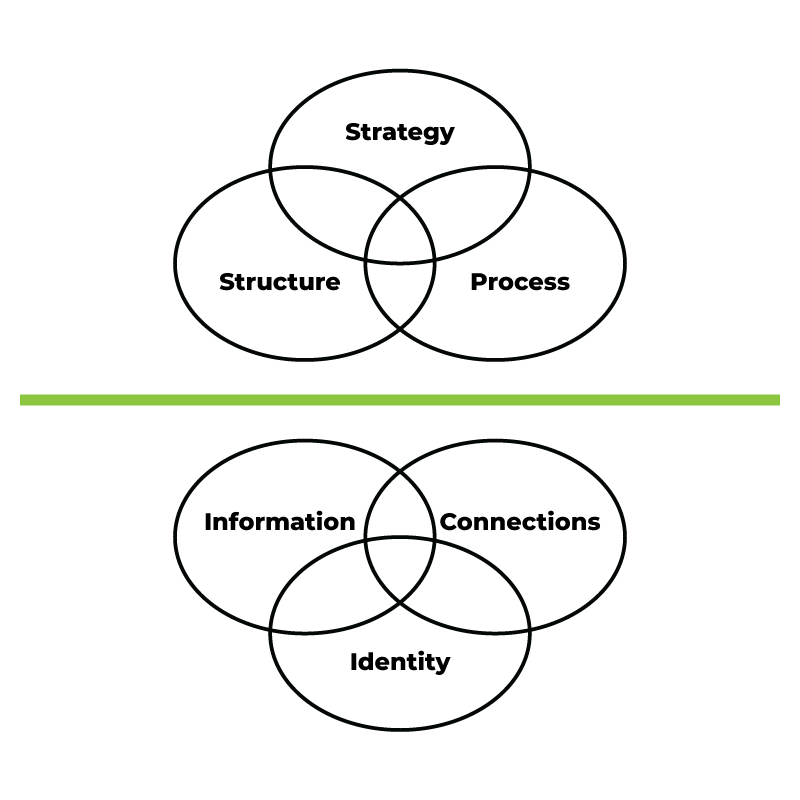In an environment that consistently demands more of us we need the capacity to continually adapt and adjust to change. A strategic mindset and workplace practices that anticipate change are required. I provide consultancy services that address these challenges – supporting organisations to take charge of change, realise their goals, build capacity and keep staff and clients at the centre of the “change project”.
I take a whole-of-system approach to working with change and organisational development. A good model for thinking about change and the systems at work within an organisation is the Six Circle Model, sometimes referred to as the “below the green line” model (developed and refined by a number of people including Marg Wheatley (1992), Tim Dalmau (2000) and Steve Zuieback (2012).

The three circles, or elements, “above the green line” – strategy, structure and process – describes the more visible, tangible and measurable elements of work – what we “do”.
The three elements “below the green line”, identity, connections and information, describe the less visible ways of “being”.
Typically organisations will invest most of their time on the elements above the green line at the expense of the critical elements below the line. Effective change management requires an investment in all the elements – change wont be sustainable if the below the green line elements are not addressed. In effect we create the conditions for change under the line that make possible the changes above the line.
Organisations assume different forms, but they emerge from fundamentally similar conditions. A self gets organised. A world of shared meaning develops. Networks of relationships take form. Information is noticed, interpreted, transformed.
Margaret Wheatley (1992)
Anchored in the Six Circle Model, and applying a range of other frameworks as required, I provide the following consultancy services:
Group facilitation and team development
We are a small group species! Much of the work we do we do in teams. Effective teams have certain characteristics:
- they are clear about identity and purpose
- there is a lot of discussion, and it’s about the about the priorities – the things that matter,
- group members are not afraid of conflict, and
- the leadership of the team is shared (everyone can lead!).
I work with teams to develop their effectiveness in these areas, helping them to clarify purpose, understand their own group dynamics and enhancing their skills in key areas such as group communication, negotiation and conflict resolution.
Change management and strategy development
Change is a constant. And whether it’s through technology, social or political change, or change to market conditions, change challenges organisations to adapt and respond.
An acknowledgement of the constancy of change is a good place to start. A strategic, problem-solving mindset and workplace practices that anticipate change are required. Critical issues to consider here include:
- Do we have an inclusive responsive strategy development processes? – are we (that is everyone in the organisation) scanning the environment, getting information to the right people, having the conversations that matter, and making good decisions?
- Do all staff have access to all the information that may enhance their effectiveness in delivering services to our clients?
- How effective is our leadership style? And our teamwork?
- Are we providing skills development opportunities that really help our staff deal with the challenges of the changes – e.g. interpersonal and conflict resolution skills to negotiate and manage what can sometimes be the “messiness of partnerships” with clients and family members?
I have extensive experience working with leadership groups to address these issues – facilitating interventions that support organisations to embrace change, define and solve their own problems, realise their goals, and build capacity. Critical to his approach is keeping staff and clients at the centre of the “change project”.
These change management initiatives include:
- Market research and facilitating the engagement of clients and other stakeholders in meaningful conversations about priorities and partnerships
- Working with staff to:
- clarify purpose, agree shared values and build effective relationships
- develop an ongoing change management and business strategy.
Capacity building
Supporting staff and developing their capacity to respond to change is a critical element of any change management strategy. I provide skills development workshops in the key areas of leadership, group facilitation, interpersonal communication, resilience, negotiation and skills for dealing with difficult people and situations. (See further information regarding training workshops here)
Program evaluation
How would we know if we got there? Evaluating the impact of the services we provide and the benefits flowing to clients and other community stakeholders is fundamental, and a requirement of practically all government funded programs.
I have extensive experience both conducting evaluations and also working with organisations to develop their own simple rigorous evaluation frameworks and data collection methodologies.
Staff recruitment and selection
Recruitment and selection services are provided, normally as part of larger change management and review projects. I have significant experience managing the recruitment and selection process, gained initially working with recruitment specialists, and further developed in numerous management and consultancy roles.
The recruitment and selection process includes: preparing position descriptions and selection criteria, developing the advertising and promotion strategy, applicant screening and short-listing, coordinating the selection panel and interview process, and referee checking.
References
Dalmau, Tim (2000): The Green Line Lens. Dalmau Network Group.
Wheatley, Margaret (1992): Leadership and the New Science. Berrett-Koehler, San Francisco.
Zuieback, Steve (2012): Leadership Practices for Challenging Times. Synectics, LLC.
